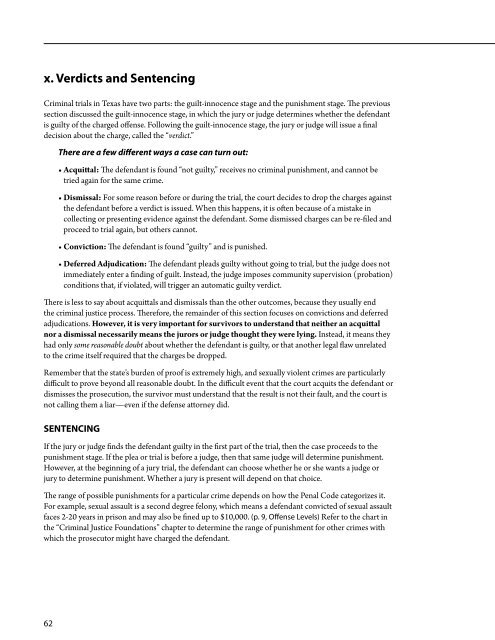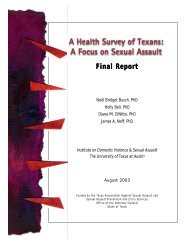Sexual aSSault LEGAL ADVOCACY MANUAL - Texas Association ...
Sexual aSSault LEGAL ADVOCACY MANUAL - Texas Association ...
Sexual aSSault LEGAL ADVOCACY MANUAL - Texas Association ...
Create successful ePaper yourself
Turn your PDF publications into a flip-book with our unique Google optimized e-Paper software.
x. Verdicts and Sentencing<br />
Criminal trials in <strong>Texas</strong> have two parts: the guilt-innocence stage and the punishment stage. The previous<br />
section discussed the guilt-innocence stage, in which the jury or judge determines whether the defendant<br />
is guilty of the charged offense. Following the guilt-innocence stage, the jury or judge will issue a final<br />
decision about the charge, called the “verdict.”<br />
There are a few different ways a case can turn out:<br />
• Acquittal: The defendant is found “not guilty,” receives no criminal punishment, and cannot be<br />
tried again for the same crime.<br />
• Dismissal: For some reason before or during the trial, the court decides to drop the charges against<br />
the defendant before a verdict is issued. When this happens, it is often because of a mistake in<br />
collecting or presenting evidence against the defendant. Some dismissed charges can be re-filed and<br />
proceed to trial again, but others cannot.<br />
• Conviction: The defendant is found “guilty” and is punished.<br />
• Deferred Adjudication: The defendant pleads guilty without going to trial, but the judge does not<br />
immediately enter a finding of guilt. Instead, the judge imposes community supervision (probation)<br />
conditions that, if violated, will trigger an automatic guilty verdict.<br />
There is less to say about acquittals and dismissals than the other outcomes, because they usually end<br />
the criminal justice process. Therefore, the remainder of this section focuses on convictions and deferred<br />
adjudications. However, it is very important for survivors to understand that neither an acquittal<br />
nor a dismissal necessarily means the jurors or judge thought they were lying. Instead, it means they<br />
had only some reasonable doubt about whether the defendant is guilty, or that another legal flaw unrelated<br />
to the crime itself required that the charges be dropped.<br />
Remember that the state’s burden of proof is extremely high, and sexually violent crimes are particularly<br />
difficult to prove beyond all reasonable doubt. In the difficult event that the court acquits the defendant or<br />
dismisses the prosecution, the survivor must understand that the result is not their fault, and the court is<br />
not calling them a liar—even if the defense attorney did.<br />
Sentencing<br />
If the jury or judge finds the defendant guilty in the first part of the trial, then the case proceeds to the<br />
punishment stage. If the plea or trial is before a judge, then that same judge will determine punishment.<br />
However, at the beginning of a jury trial, the defendant can choose whether he or she wants a judge or<br />
jury to determine punishment. Whether a jury is present will depend on that choice.<br />
The range of possible punishments for a particular crime depends on how the Penal Code categorizes it.<br />
For example, sexual assault is a second degree felony, which means a defendant convicted of sexual assault<br />
faces 2-20 years in prison and may also be fined up to $10,000. (p. 9, Offense Levels) Refer to the chart in<br />
the “Criminal Justice Foundations” chapter to determine the range of punishment for other crimes with<br />
which the prosecutor might have charged the defendant.<br />
62
















